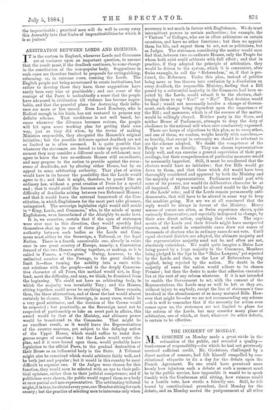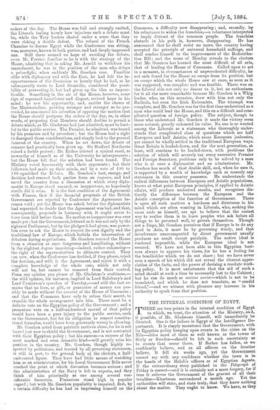THE INCIDENT OF MONDAY.
MR. OOSCHEN on Monday made a great stride in the estimation of the public, and revealed a quality— fearlessness of responsibility—for which he had not previously received sufficient credit. Mr. Gladstone, challenged by a direct motion of censure, had felt himself compelled by con- stitutional etiquette to fix a day for the debate upon the French Agreement. No one could have perceived more keenly how injurious such a debate at such a moment must be to the public service, how impossible it would be to speak frankly with the Conference still sitting, how ruinous would be a hostile vote, how sterile a friendly one. Still, he felt bound by constitutional precedent, fixed Monday for the debate, and on Monday moved the postponement of all other orders of the day. The House was full and strongly excited, the Liberals feeling keenly how injurious such a debate must be, while the Tory leaders chafed under a sense that they were risking a double defeat. The refusal of the French Chamber to discuss Egypt while the Conference was sitting, was, moreover, known to both parties, and had deeply impressed one. Still there seemed no hope of avoiding the debate, even Mr. Forster, familiar as he is with the strategy of the House, admitting that in asking Mr. Arnold to withdraw his amendment, he was in the position of the man who delays a prize-fight, when suddenly Mr. Goschen rose. Familiar alike with diplomacy and with the East, he had felt the in- opportuneness of the discussion so keenly that he had, as he subsequently wrote to Lord Granville, considered the possi- bility of preventing it, but had given up the idea as imprac- ticable. Something in the air of the House, however, some sign of repressed impatience and disgust, revived hope in his mind ; he saw his opportunity, and, amidst the cheers of the Ministerialists, growing stronger and stronger as he pro- ceeded, he announced his intention of opposing the motion that the House should postpone the orders of the day, or, in other words, of proposing that Members should decline to permit a debate which, as Mr. Gladstone had just admitted, must be hurt- ful to the public service. The Premier, he admitted, was bound by his promises and by precedent ; but the House had a right to disregard those considerations, and simply look to the general interest of the country. When he sat down, the debate of censure had practically been given up. Sir Stafford Northcote raised a feeble protest ; Mr. Raikes uttered a cynical snarl, as unworthy of himself as of the University he misrepresents ; but the House felt that the solution had been found. The Ministry voted honourably with their opponents ; but their followers had made up their minds, and by a vote of 190 to 148 squelched the Debate. Mr. Goschen's tact, energy, and decision had rescued both parties from an impasse, and had saved the country from a discussion at which every diplo- matist in Europe stood amazed, so inopportune, so hopelessly sterile did it seem. It is the first condition of the Agreement with France, that if the financial proposals of the British Government are rejected by Conference the Agreement be- comes void ; yet the House was asked, before the diplomatists had separated, to decide that the Agreement was bad, and that, consequently, proposals in harmony with it ought never to have been laid before them. No motion so inopportune was ever made yet ; but the Government, fettered as it was not only by the rights of Parliament, but by the pledges it had given, was power- less even to ask the House to respect its own dignity and the traditional law of Europe, which forbids the intervention of debaters during negotiations. Mr. Goschen rescued the House from a situation at once dangerous and humiliating, without in the slightest degree impairing—indeed, rather enhancing— the right of the representatives to ultimate control. They can now, when the Conference has decided, if they please, reject the decision, and with it the Agreement, and reject it with a complete knowledge of the whole case, which not only will not be, but cannot be removed from their control. Form any opinion you please of Mr. Gladstone's craftiness,— the wild opinion, for instance, implied in Lord Salisbury's and Lord Carnarvon's speeches of Tuesday,—and still the fact re- mains that no loan, or gift, or guarantee of money can pos- sibly be made without the consent of the House of Commons ; and that the Commons have only to refuse their assent, to crumble the whole arrangement into bits. There must be a definite vote on the Egyptian policy of the Government ; and a premature vote on a half-understood morsel of that policy would have been a pure injury to the public service, such as the Government, but for its obligation to respect constitu- tional formulas, would have been grievously wrong in allowing.
Mr. Goschen acted from patriotic motives alone, for he is not bound just now to shield the Government, and is not contented with their Egyptian policy ; but his success—a success of the most marked and even dramatic kind—will greatly raise his position in the country. Mr. Goschen, though highly re- spected by politicians, and trusted by all governing statesmen, is still in part, to the general body of the electors, a half- understood figure. They have had little means of watching him as an administrator, for his Local Government Bills never reached the point at which discussion becomes serious ; and the administration of the Navy is left to experts, and they think of him principally as one among several con- siderable financiers. Financiers stand high in popular regard ; but with Mr. Goschen popularity is impaired, first, by a certain difficulty he has had in impressing himself on the Commons, a difficulty now disappearing ; and, secondly, by his reluctance to widen the franchise,—a reluctance interpreted to imply distrust of the common people. The franchise obstacle in his path is, however, disappearing. He has announced that he shall resist no more, the country having accepted the principle of universal household suffrage, and shall confine himself to the improvement of the Redistribu- tion Bill; and the scene of Monday reveals to the electors that Mr. Goschen has learned the most difficult of all arts, that of leading the House of Commons. Called upon to act in a moment, in circumstances of unprecedented difficulty, he not only found for the House an escape from its position, but an escape which the whole House saw at once, as soon as it was suggested, was complete and was feasible. There was on the Liberal side not only no demur to it, but an enthusiasm for it all the more remarkable because Mr. Goschen is a Whig leader, who, on this occasion, drew with him not only the Radicals, but even the Irish Extremists. The triumph was complete, and Mr. Goschen was for the first time understood as .a man who could lead the House, and this on a difficult and com- plicated question of foreign policy. The subject, though to those who understood Mr. Goschen it made the victory seem more natural, greatly enhanced its value. No one is so wanted among the Liberals as a statesman who thoroughly under- stands that complicated class of questions which are half European and half Asiatic, which rouse European jealousies, yet cannot be wholly settled in the traditional European ways. Great Britain is loaded-down, and for the next generation, at least, will continue to be loaded-down, with problems the solution of which will severely tax every successive Premier and Foreign Secretary, problems only to be solved by a man who is at once a diplomatist and an adminstrator. Mr. Goschen has much of that double skill, and, when he uses it, is supported by a wealth of knowledge such as scarcely any statesman in this country possesses. He understands the radical differences between European and Asiatic populations, knows at what point European principles, if applied to Asiatic affairs, will produce undesired results, and recognises dis- tinctly the difference between the European and the Asiatic conception of the function of Government. There is upon all such matters a hardness and directness in his mind which are often wanting in Liberals, who, seeking the same ends as himself, are apt to believe that the easiest way to realise them is to leave peoples who ask before all things to be governed well, to govern themselves. Though not a Jingo, Mr. Goschen perceives that if Europe is to do any good in Asia, it must be by governing wisely, and that interference unaccompanied by direct government usually produces no result except paralysis. The native ideal is rendered impossible, while the European ideal is not secured. We have not been able in this Egyptian busi- ness always to approve his views, for he has a feeling for the bondholder which we do not share ; but we have never seen a speech of his which did not reveal the clearest appre- ciation of the facts, and the power of devising a resolute work- ing policy. It is most unfortunate that the aid of such a mind should at such a time be necessarily lost to the Cabinet ; but he can do much as amicus curice—which is not to be translated, and which he does not translate, as " candid friend,"—and we witness with pleasure any increase in his authority to speak from that position.











































 Previous page
Previous page